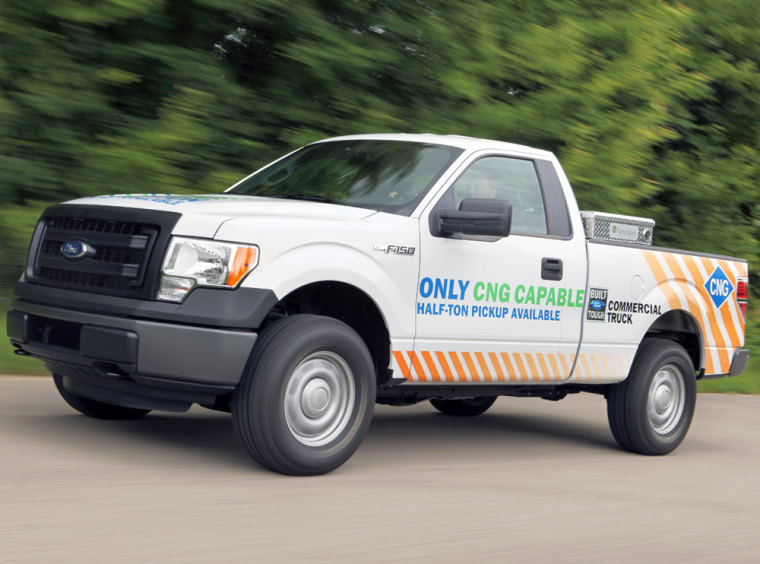While America flows with relatively cheap natural gas, the fuel has largely been ignored by the auto industry – but that could soon change as Ford and other manufacturers become increasingly fired up about it as an alternative to gasoline.
Until now, Ford had relied on aftermarket converters to service the relatively few customers who have wanted to run their vehicles on compressed natural gas, or CNG. But the automaker will offer a CNG option on its half-ton, or light-duty, pickup later this year.
Buyers will be able to order the F-150 truck fueled by either natural gas, or LPG -- liquefied petroleum gas, which comprises propane, butane or a mix of the two.
(Read more: Chevy Impala Named Top Sedan by Consumer Reports)
The options won’t come cheap, with the total costs running as high as about $10,000. But for fleet customers who clock significant mileage each year, the savings should quickly add up since CNG costs barely half as much as regular-grade gasoline.
“Businesses and fleet customers have been asking Ford to make F-150 available with CNG capability to take advantage of the fuel’s low price and clean emissions,” explained Jon Coleman, Ford fleet sustainability and technology manager. “With the money saved using CNG, customers could start to see payback on their investment in as little as 24 to 36 months.”
Owners aren’t the only ones who could benefit from the increased use of CNG. According to the Environmental Protection Agency, the fuel produces about 30 percent less greenhouse gas emissions than regular unleaded gasoline on a per-mile basis.
Then why hasn’t CNG been gaining more traction, especially as the nation’s fracking boom creates a veritable glut of the gaseous fuel? There are a number of potential problems:
* For one thing, there are relatively few places where a motorist can re-fuel. Most CNG stations are operated by private fleets that have already taken advantage of the reduced operating costs;
* CNG tanks are large and round and take up a lot of space in a trunk or cargo bed where plastic fuel tanks can be tucked into various nooks that don’t rob storage or passenger space;
* The tanks and other necessary equipment modifications aren’t cheap.
(Read more: Parents Tech Kids Distracted Driving Habits)
Indeed, Ford says the new option it will begin offering for 2014 models will cost $315 as the maker upgrades the fuel line, switches to modified valves, pistons and rings that can tolerate the drier fuel. The final modifications could add another $7,500 to $9,500 to the price tag.
But the payback could come quickly considering CNG currently goes for around $2 for the equivalent of a gallon while gasoline has been pressing up as high as $4 a gallon in the U.S. in recent months, according to the AAA. The precise savings will vary depending on both the final installation cost and the number of miles an owner logs – the more the vehicle is driven the faster the payback.
The Ford CNG/LPG package will be offered specifically for use with the maker’s 3.7-liter V-6 engine. Along with the new F-Series package, Ford already has CNG/LPG prep kits available for various commercial truck models, the Transit and Transit Connect vans, F-Series Super Duty pickups and E-Series vans.
Like those other packages, the new F-Series prep kit will allow a driver to run on cheaper CNG or switch to regular gasoline if the alternative fuel isn’t available.
(Read more: Chrysler Earnings Surge 16%, Helps Bail Out Italian Partner Fiat)
Ford isn’t entirely alone in offering a bi-fuel truck capable of running on alternative fuels like natural gas. Chrysler and General Motors have their own packages. And a number of aftermarket “up-fitters” will convert just about any vehicle to use CNG for a price. The gas has become popular with taxi and bus fleets around the country, for example.
Even so, only an estimated 125,000 of the 250 million vehicles now on the road in the United States can use CNG, according to the Department of Energy. Ford hopes to add another 15,000 this year alone.
Last year, a coalition of 22 states advised automakers they would create a market of as much as 5,000 to 10,000 CNG-fueled vehicles annually, something Colorado Gov. John Hickenlooper said he believed “should be enough to get them to move.”
"Right now as a transition fuel, it's way ahead of those other choices," said Hickenlooper, referring to battery power and hydrogen fuel cells. "It's less expensive, it's cleaner."
